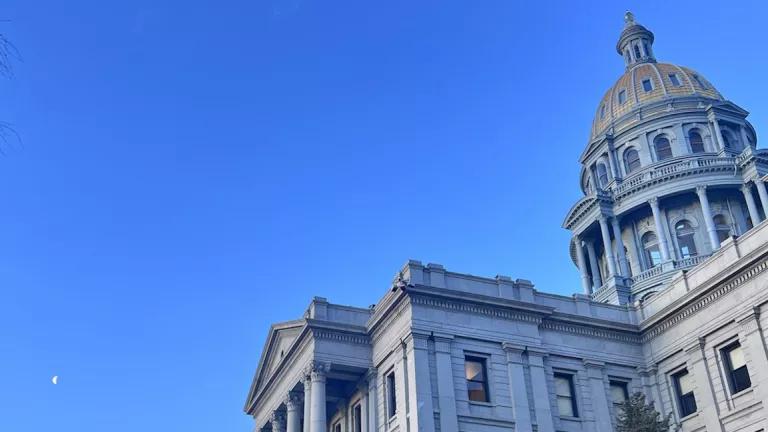Colorado Legislative Roundup: 2023
A suite of important, yet heavily negotiated, environmental bills are making their way to Governor Polis’s desk.

The Colorado State Capitol Building
Alana Miller
The 2023 Colorado legislative session has ended, and a suite of important, yet heavily negotiated, environmental bills will make their way to Governor Jared Polis’s desk to sign into law. This year, the legislature focused on emerging climate technologies, the role of state government in setting minimum standards, the need for dramatic action on air pollution, and how to protect workers and disproportionately impacted communities.
For months, NRDC worked alongside partners, legislators, and the Polis administration to craft bills that would help advance environmental justice, reduce air pollution and climate emissions, and provide consumer protections for Coloradans. With meaty topics that would have significant impacts on Colorado communities and the environment, many bills were debated until the very last minute of session, wrapping up late on Monday night, May 8, 2023.
The following bills adopted by the legislature were priorities for NRDC at the capitol this session.
Planning for emissions reductions
The Clean Energy Plans (SB23-198) bill expands and improves Colorado’s Clean Energy Plan process, putting the electricity sector on a better pathway to meeting emissions reductions that are critical for decarbonizing nearly every other sector. The bill requires that large power providers demonstrate how they will reduce emissions by 80 percent by 2030, and it set a 46 percent reduction by 2027 for any future Clean Energy Plans submitted by utilities. The bill also establishes a critical check-in process so that the state can evaluate if utilities are on track to meet required reductions while improving transparency and providing the opportunity for public involvement.
The Greenhouse Gas Emission Reduction Measures (SB23-16) bill tackles a number of climate-related policies, including those regarding wastewater thermal energy, electric lawn equipment, and transmission planning. Critically, the bill updates Colorado’s greenhouse gas emissions goals, adding interim targets for 2035, 2040, and 2045, while increasing existing 2050 targets from 90 percent below 2005 levels to 100 percent. This aims to ensure the state is moving toward economy-wide decarbonization and making regular progress, thereby reducing cumulative emissions released into the atmosphere.
The Pollution Protection Measures (HB23-1294) billseeks to address ozone pollution and other health impacts from oil and gas operations. Though significantly pared down due to industry lobbying, the bill implements meaningful reforms, including an improved public complaint process for air quality concerns, with stronger penalties for violations, and a rulemaking that must define, evaluate, and address cumulative impacts. The bill also establishes an interim legislative committee to identify additional policy reforms to address Colorado’s ozone crisis.

A packed hearing room during testimony on proposed land use reform.
Alana Miller
Transitioning off fossil fuels
Utility Regulation (SB23-291) stemmed from a legislative effort to evaluate high utility bills; it found that recent spikes in Coloradans’ bill prices were primarily driven by reliance on fossil gas in buildings and homes. The bill takes critical steps to protect consumers from bad investments that prolong the use of fossil fuels, including ending subsidies for connecting new properties to the gas system, disallowing utilities from using ratepayer money for gas promotional campaigns, and strengthening long-term gas planning requirements.
Advance the Use of Clean Hydrogen (HB23-1281) recognizes the role that clean hydrogen may play in decarbonizing certain industries, including high-heat manufacturing and long-distance trucking, while setting necessary guardrails to prevent incentives for hydrogen production that would increase greenhouse gas emissions in the state. The bill establishes a tax credit for hard-to-electrify end uses, where hydrogen will likely be most effective, and institutes a rulemaking at the Colorado Public Utilities Commission for hydrogen project applications.
Labor Requirements for Energy Sector Construction (SB23-292) expands workforce standards to clean energy projects to ensure that clean energy infrastructure is built by a well-trained Colorado workforce that is paid family-supporting wages. The bill also aligns labor requirements with Inflation Reduction Act workforce standards, allowing utilities and clean energy projects to utilize prevailing wages and employ registered apprentices, or to use a Project Labor Agreement. We worked closely with our allies in organized labor and the BlueGreen Alliance to make sure this bill was a success and tailored to help Coloradans.
Setting statewide minimum standards
The Environmental Standards for Appliances (HB23-1161) bill updates existing appliance standards laws with new energy and water standards, as well as a mercury phaseout for light bulbs. The bill lowers the allowable nitrogen oxide emissions for natural gas appliances (from common furnaces, boilers, and water heaters), which will help reduce dangerous air pollution and make homes healthier for people.
The Electric Vehicle Charging and Parking Requirements (HB23-1233) bill requires that the state electrical board adopt rules for electric-ready, solar-ready, and electrical vehicle (EV) charging capabilities for multifamily buildings. It also prevents homeowners associations, local governments, or other entities from restricting the parking and charging of EVs, and it specifies that EV charging spaces count toward parking minimums. Additionally, the bill included a new statewide definition of disproportionately impacted communities, requiring that all state agencies use the same definition, which was the product of stakeholder conversations and a key recommendation from the state Environmental Justice Action Task Force.
In a disappointing blow on the last evening of session, the Land Use (SB23-213) bill was killed by the state senate. The bill, which would have included minimum levels of housing development around transit and allowed more housing types in neighborhoods where it is now illegal to build anything besides a stand-alone single-family home, had been heavily amended since its introduction. Ultimately, the two chambers failed to reach agreement on any policies that would meaningfully address land use in the state, despite the opportunity for such policies to significantly reduce emissions and lower housing costs. During the process, NRDC had joined a strong coalition of environmental groups, housing organizations, and advocates, which will continue to demand action from state leaders to spur more affordable and sustainable housing.
Despite setbacks, Coloradans will reap significant benefits from a number of bills passed this session. Looking forward, we will continue to work with our partners to secure emissions reductions and advance environmental progress, public health protections, and improved worker standards.




